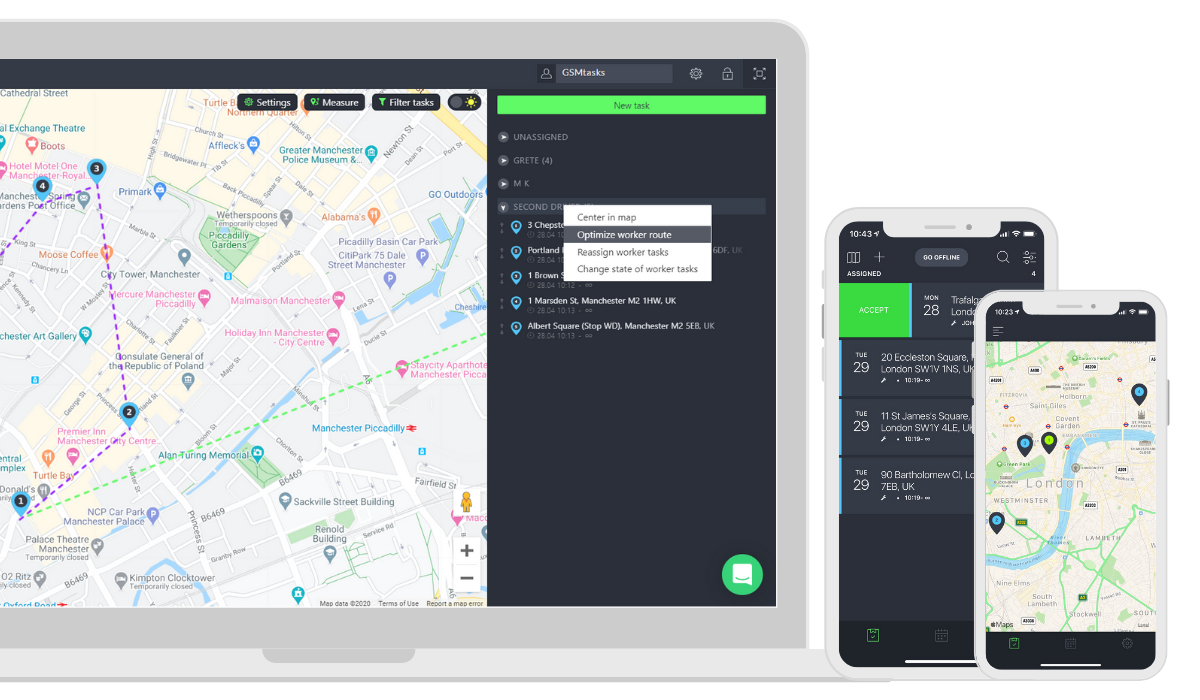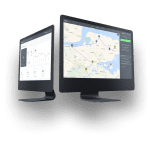From chaos to control: why Fleet Management Software is a game-changer
Fleet management software assists fleet managers in gaining real-time visibility into their operations whilst enhancing driver satisfaction and reducing fuel usage through predictive analytics and precise reporting.
That is why fleet managers use the finest fleet management software to help oversee their day-to-day operations.
What is fleet management?
Any organisation that requires commercial vehicles to operate engages in some form of fleet operations and fleet management. Fleet management aims to supervise all fleet performance and maintenance to enhance productivity and ensure smooth business operations.
Fleet managers are responsible for overseeing fleet operations. Their tasks may encompass vehicle maintenance, monitoring fuel consumption and fuel costs, managing drivers, optimising asset utilisation, planning routes, and implementing programs to boost company productivity and reduce instances of waste.

What is fleet management software?
Fleet Management Software lets fleet managers quickly access relevant information on their fleet’s performance. It is a sophisticated database with multiple applications, facilitating the recording and reporting of critical attributes that enhance efficiencies and reduce costs. This is achieved by minimising downtime and increasing productivity.
In summary, integrating a software system into fleet management improves the management of the following:
- Vehicles, assets, and equipment
- Maintenance and repair
- Fuel and emissions
- Drivers, including driver’s licence checks
- Inspections, defect reporting, and audits
- Inventory and parts
- Accident and risk management
- Regulatory and legal compliance
- Budget and forecasting
10 challenges facing fleet managers
A fleet manager is responsible for taking care of the following tasks:
1. Driver safety
A significant challenge for fleet companies or managers is keeping drivers safe. Ensuring safe driver behaviour can be difficult, mainly when fleet managers are hundreds of miles from the moving vehicle. Fleet managers can use helpful tools- like dash cams or vehicle tracking systems- that bring real-time visibility into an otherwise remote vehicle and provide evidence or materials to implement driver training.
2. Retaining drivers
Driver shortages are a growing issue in the trucking industry. Stabilising and increasing driver retention is something fleet managers need to always aim for. By creating mentorship programs, improving workplace conditions, or simply building more vital trust between driver and manager, fleet managers look to different approaches to ensure drivers are happy at work.
3. Fuel cost management
One of the most significant cost-saving challenges for global and local fleet managers is the continuous rise in fuel costs. Fluctuations in market prices and external factors influencing fuel prices are beyond a fleet manager’s control, but options are available to help reduce fuel consumption and costs.
Once the preferred choice for fuel, diesel vehicles have declined in popularity following the Volkswagen emissions scandal and negative publicity surrounding harmful NOx emissions. The government’s response of adding a tax surcharge has understandably impacted diesel vehicle sales. Despite this, an effective fleet manager must assess the available options to determine if they still offer the most significant cost savings. Petrol remains the dominant fuel in the market, but the margin is decreasing due to the increasing popularity of electric and hybrid vehicles.
Selecting the right fuel card is crucial for any fleet, ensuring the best value deal that meets their needs. Additionally, telematics can play a vital role in remotely monitoring driver behaviour and its impact on fuel management. Telematics also provide the ability to track vehicles and determine the most cost-effective routes.
4. Fleet tracking
To ensure driver safety, fleet managers need to know precisely where individual vehicles are at any given time. Although this might seem straightforward, tracking vehicle location can be challenging whether a fleet includes five vehicles or 5,000. Fleet managers often rely on GPS technology and other GPS tracking systems to know their vehicles’ locations and increase visibility into their fleet operations and vehicle safety.
5. Electronic Logging Device (ELD) compliance
The ELD mandate requires commercial vehicle operators to record Hours of Service (HOS) electronically. The mandate intends to replace paper logging and reduce dangerous driving caused by fatigued drivers. Fleet managers must implement ELD-compliant systems for fleets subject to the mandate to ensure they accurately record drive time.
6. Non-fuel cost reductions
Whether fuel management or lowering operating costs, fleet managers must identify and weed out unnecessary expenses to help create more cost-friendly and efficient fleet operations. Operational, fuel and maintenance costs can quickly add up. Whether instating fuel efficiency programs (fuel prices are high or low) or asset tracking, the fleet manager must determine cost-saving solutions and help a company increase productivity.
Managing and cutting costs is a constant priority for any business, and fleet management is no different. Fleet managers must carefully analyse pertinent information about their fleet and identify areas that can be enhanced, such as reducing vehicle purchase expenses, reviewing fuel consumption, and analysing driver behaviour – all aimed at achieving more with fewer resources.
7. Vehicle Acquisition
To effectively manage a fleet, a fleet manager needs to forecast how many and what type of vehicles a fleet will need to operate efficiently. It might seem straightforward to purchase new vehicles when needed, but correctly understanding and forecasting fleet vehicle utilisation is paramount in determining a purchase strategy. Employee eligibility for a vehicle class, vehicle lifecycle, and even market timing are all significant factors contributing to a sound vehicle acquisition strategy.
8. Meeting compliance requirements
Daily checks, inspection sheets, driver checks, defect reporting, MOTs, and insurance are integral components of compliance and fleet risk management. All these aspects must be conducted and documented meticulously, ensuring a complete trail of information for each vehicle. This documentation serves important purposes, including facilitating audits and providing essential data in case of accidents, claims, or investigations.
Vehicle legislation is changing, particularly with the move to the WLTP vehicle testing structure, so fleet managers must be aware of legislation changes that could directly impact their operation and act accordingly.
9. Avoiding information overload
Fleets generate a wealth of data that a fleet manager can review, some of which might be useful, but probably not all. Going through such vast amounts of information is time-consuming and risks overlooking crucial, relevant details.
Moreover, updating this data comes with administrative time and financial implications. Fleet management software can assist in sifting through unnecessary information and generating reports on the specific areas you require. It can also help when you have the information but are uncertain about how to utilise or analyse it accurately.
10. Expanding the role of the fleet manager
The role of technology is evolving rapidly, leading to an expansion of a fleet manager’s responsibilities. With this change, mobility management, asset management, and the responsibility for measuring and controlling a business’s environmental impact will gradually fall under the purview of the fleet manager. In this context, incorporating fleet management software will become crucial in facilitating the successful execution of these tasks.
What are the benefits of fleet management?
Any organisation that incorporates vehicles for business purposes requires professional fleet management. The primary aim is to efficiently control the entire lifecycle of commercial vehicles, mitigate associated risks, enhance operational efficiency, increase productivity, and ensure compliance with relevant legislation. Including private vehicles used for work purposes, commonly called the grey fleet, is also crucial in this process.
Fleets are prevalent across various industries, including hauliers, couriers, sales, service, utilities, public transport, and emergency services. Managing a fleet allows companies to control associated costs effectively, maintain marketplace competitiveness, and meet customer service expectations.
Implementing fleet management software is beneficial, enabling fleet managers to have real-time visibility into their operations. This, in turn, leads to increased driver satisfaction and reduced fuel usage through predictive analytics and accurate reporting.
What is the best fleet management software?
Fleet management software empowers businesses to monitor, track, and generate comprehensive performance reports for their vehicle fleets. This software facilitates the creation of more efficient driving routes, enables vehicle inventory tracking, offers cost management and analysis capabilities, and monitors driver performance. Additionally, fleet management tools incorporate mobile components to support real-time updates and communications, allowing managers and fleet employees to collaborate seamlessly and maximise delivery operation efficiency.

GSMtasks is the best fleet management software because it is a sophisticated but easily navigated system equipped with internet-connected sensors and software; it is dedicated to helping businesses in various sectors, including transportation, logistics, food production, and construction, enhance their fleet operations’ efficiency, safety, and quality. By staying compliant and streamlining fleet operations, GSMtasks fleet management software proves invaluable. For those interested, we offer a demo and free trial—reach out to us today.





